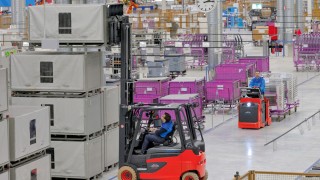
How about refueling a vehicle in just three minutes and no emissions during operation? What sounds like wishful thinking are two major advantages of one of the most promising energy systems of the future: fuel cell technology.
In addition to the application requirements, aspects such as the space required for refueling or charging, energy costs and environmental compatibility play an important role in the selection of the appropriate energy system for industrial trucks. With this in mind, there is increasing focus on alternative drive systems that offer advantages over conventional solutions such as lead-acid batteries.
This not only includes lithium-ion batteries, but also fuel cells. Linde Material Handling was the first manufacturer to begin exploring this technology and has been developing ready-to-use solutions since 2000. This gives logistics companies the opportunity to benefit from this future-oriented technology today.
How do fuel cells work?
Fuel cells work in a similar way to batteries, meaning that energy is generated by a chemical reaction. The crucial difference: In the fuel cell, hydrogen and oxygen react to produce electricity, heat and water. This process is also called 'cold combustion' and has some advantages, but also technical challenges.
Linde has solved the challenges together with technology partners and by converting the forklift trucks. For example, the heat generated is dissipated by a fan. In addition, an additional lithium-ion battery in this hybrid system ensures that peaks in performance are also covered. Also, the braking energy is regenerated and fed back into the battery. This means that nothing stands in the way of everyday use in logistics. On the contrary, the technology has some astonishing properties that will change the way industrial trucks are used forever.
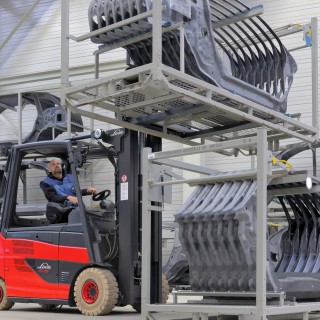
8 ADVANTAGES OF HYDROGEN TECHNOLOGY
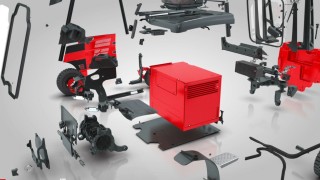
IDEAL APPLICATIONS
Multi-Shift Operation
By eliminating the need for battery changes, along with fast fueling and the continuous performance level of the energy system, fuel cells increase efficiency in demanding multi-shift operation. This makes the technology interesting for production environments as well as intensive logistics services, such as online mail order.
Food and Pharmaceutical Industry
Hygiene requirements such as Hazard Analysis and Critical Control Points (HACCP) play a central role in the logistics of the food industry. In the pharmaceutical industry, too, the strict guidelines of 'Good Distribution Practice' (GDP) apply. Compared to lead-acid batteries, fuel cells eliminate possible contamination by acid or other chemicals.
Automotive and Supply Industry
High turnover rates as well as tight deadlines and cost targets in the automotive and supply industry rely on industrial trucks with high availability and continuous performance levels across all shifts. Fuel cell technology is the optimum solution to these requirements.
Tight Space Constraints
By eliminating the need for battery charging and changing stations, valuable storage space can be gained. The low-emission energy system also protects the ambient air under tight space constraints.
FUEL CELLS IN THE FIELD
Study with BMW Group Confirms Economic Efficiency
Linde Material Handling relies on strong and experienced partners for the development of industrial trucks with fuel cell technology. Under the name "H2IntraDrive", a comprehensive study of the economic and technical possibilities was launched in 2013 together with the BMW Group and the Chair of Materials Handling Material Flow Logistics at the Technical University of Munich.
For this purpose, hydrogen-powered forklift trucks were used in the body shop of BMW-i vehicles in Leipzig – for over 20,000 operating hours. The result: The jointly developed hydrogen drive is already marketable today and can be used economically under certain conditions. The technology made an excellent overall impression, by demonstrating its high availability in day-to-day use within a production environment, and less environmental impact due to its use of regeneratively produced hydrogen. Another study has been running since 2017 under the name FFZ70.
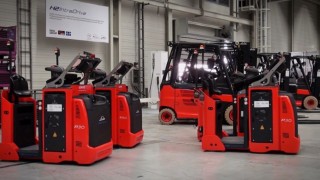
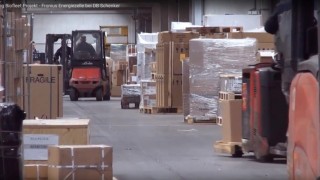
Field Test in DB Schenker Transhipment Warehouse
'E-LOG-BioFleet' is a joint project between Linde Material Handling, Fronius International, DB Schenker, OMV, HyCentA Research and Joanneum Research. In one of DB Schenker's transshipment warehouses in Hörsching, Austria, ten pallet trucks with fuel-cell hybrid drive and the first indoor refueling system for hydrogen in Europe were tested in practice.
In the publicly funded project, it was possible to fully integrate the vehicles into the shift operation after a short introduction phase. The basic power requirement is also generated by the fuel cell, an integrated lithium-ion battery covers the power peaks and stores the recovered energy during braking.
Thanks to an optimized operating strategy and the recovery of braking energy, the system achieved a high degree of efficiency of up to 53 percent. At the same time, a vehicle produced one third less greenhouse gas over its entire life cycle than a comparable vehicle with lead-acid battery. The hydrogen came from reformed biogas.
Efficient Plant Logistics at Mercedes-Benz
With the motto "Daimler Goes Green", Mercedes-Benz is testing the use of forklifts with fuel cell drive. The location is the world's largest plant for Mercedes Sprinter vans in Düsseldorf. The popular transporters are produced here in three-shift operation.
Hydrogen technology helps to save time and personnel costs for changing batteries. Within just three minutes, the fuel cell is refilled with hydrogen and the truck is ready for use. The technology therefore creates the ideal conditions for smooth shift changes.
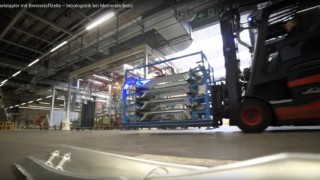
REQUIREMENTS & PERSPECTIVES
Achieving the Optimal Business Case with Hydrogen
Fuel cell technology is basically ready for use and, depending on the application requirements, even constitutes the ideal energy system for some companies. However, the right solution and the associated investments must be developed individually for each company. There are a number of prerequisites for economical and efficient use:
- Fleet size: As a rule, an economical business case arises from the use of around 20 vehicles.
- Infrastructure: In cases where there is a pre-existing hydrogen infrastructure for fueling, economical use is usually possible. If this infrastructure has to be created from scratch, the economic viability must be examined on a case-by-case basis.
- Subsidies: Where there are subsidy opportunities for the establishment of a sustainable, hydrogen-powered fleet, this increases the likelihood that a viable solution can be implemented.
Investing in Sustainable Technology
Linde Material Handling regards fuel cells as a pioneering technology of the future. For this reason, the company is gradually integrating appropriate solutions into new products. As a result, this extraordinary energy system is developing into an everyday product that will replace conventional drives in many areas.










